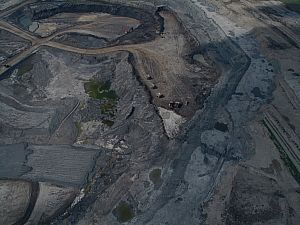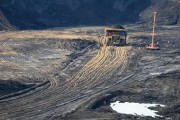As our federal government removes more environmental hurdles for industrial activity and the oilsands industry shows off its plans to expand approved production to 5.25 million barrels a day, it would seem reasonable to assume Canadians must be on board with rapid oilsands expansion.
Industry representatives certainly seemed to think so, as documents published late this past summer revealed that oilsands industry lobby groups felt their multimillion dollar marketing campaign to brush up the public image of the oilsands was starting to pay off.
But the flurry of activity from Canadians opposing oilsands expansion over the past two weeks suggests just the opposite. Take the Nobel Women’s Initiative, for instance, which last week called for a full public inquiry into the impacts of oil sands development on communities in Alberta and British Columbia. Or the thousands of people who participated in yesterday’s Defend our Coast action at the B.C. legislature — it’s clear Canadians disagree with the status quo and are turning up the heat on new oilsands and pipeline projects seeking approval.
Today marks a landmark shift in that opposition, with the start of a hearing into the Athabasca Chipewyan First Nation’s (ACFN) constitutional challenge against Shell Canada’s application to expand the Jackpine Mine oilsands project. The first of its kind in Alberta, the constitutional challenge is based in part on concerns that Shell’s project will impact the ACFN’s ability to exercise treaty rights such as hunting and fishing in a meaningful way into the future.
The rampant development of the oilsands without appropriate safeguards has serious implications for caribou habitat, Athabasca water flows and the loss of wetlands, to name a few — and each of these issues overlaps at least in part with aboriginal rights.
Caribou
 According to a recent ACFN report, meaningful practice of First Nation treaty rights “depends on having sufficient lands and resources to exercise those rights.” The report notes that Treaty No. 8 livelihood rights have been “rendered useless” due to the impacts of industrial development on the habitat of species of cultural concern. If Shell’s Jackpine mine expansion and other proposed developments in the region are approved, caribou and other species of cultural concern will lose more than 20 per cent of their high-value habitat in the 2.3 million hectare terrestrial regional study area — a threshold identified in a previous oilsands mine review decision as representing a significant adverse effect. As my colleague Simon Dyer has argued, there is no question as to what needs to be done to protect caribou — increasing conservation areas, accelerating reclamation and slowing development is simply a matter of political will and corporate responsibility.
According to a recent ACFN report, meaningful practice of First Nation treaty rights “depends on having sufficient lands and resources to exercise those rights.” The report notes that Treaty No. 8 livelihood rights have been “rendered useless” due to the impacts of industrial development on the habitat of species of cultural concern. If Shell’s Jackpine mine expansion and other proposed developments in the region are approved, caribou and other species of cultural concern will lose more than 20 per cent of their high-value habitat in the 2.3 million hectare terrestrial regional study area — a threshold identified in a previous oilsands mine review decision as representing a significant adverse effect. As my colleague Simon Dyer has argued, there is no question as to what needs to be done to protect caribou — increasing conservation areas, accelerating reclamation and slowing development is simply a matter of political will and corporate responsibility.
Athabasca River flows
Oilsands mining operations divert substantial amounts of water from the Athabasca River, which can put pressure on aquatic ecosystems during low-flow periods. To support the Jackpine mine expansion, Shell is proposing to increase the amount of water it is allowed to withdraw from the Athabasca River by 18 million cubic metres per year. Water allocations for human use have been growing the fastest in the Athabasca River basin — 13 times faster than the provincial average in the past decade. Allocations have nearly doubled in the past decade mostly due to oilsands expansion.
Aboriginal communities remain concerned about the impact of the Lower Athabasca River’s low-flow periods on access to culturally significant places, travel on the river, and opportunities to pass cultural practices and traditional knowledge on to future generations. Federal and provincial governments are overdue to establish and enforce an ecological base flow limit for the Athabasca River, which would restrict the withdrawal of water during low-flow periods. Such a limit has been recommended in various joint review panel decisions over the past eight years and in independent reviews of water management policies and practices in the region.
Wetlands
About 40 to 60 per cent of northeastern Alberta is high value wetland habitat. Wetlands continue to be closely linked to the traditional way of life for Aboriginal communities in terms of subsistence hunting and trapping, for food and medicinal plant collection, and for spiritual well being. Wetlands common to northeastern Alberta also store carbon and help to mitigate climate change. Shell’s environmental assessment projects that 18 per cent (185,872 hectares) of the wetlands in the regional study area will be lost or altered as a result of the Jackpine mine expansion and other industrial activity.
Recreating wetlands following open pit mining remains an ongoing challenge; the marshes that have been reconstructed to date, and which Shell proposes as substitutes for the original wetlands, are salty and support fewer species. The permanent wetland loss of bog and fen types has serious consequences for culturally significant species such as woodland caribou.
Unlike U.S. jurisdictions, Alberta has neither a wetland policy nor conservation offset policies for its forested areas. Unfortunately in the absence of this much-needed policy, Shell hasn’t proposed any way to adequately compensate for the loss of peatlands, wetlands or old-growth forest resulting from its mine expansion.
In short, the impacts associated with oilsands expansion are getting worse, not better. And despite what industry lobby group’s polling says, so is the opposition from First Nations, Canadians and international audiences at large. No single project is responsible for the level of current and forecasted environmental impacts in the oilsands region — the bigger issue is the cumulative impact that comes with 2, 5 and 7 million barrels’ worth of oilsands production.
It’s no wonder we’re seeing the first constitutional challenge against an oilsands project — and we could see more if governments and companies don’t recognize that it is in their best interests to properly address the concerns of directly impacted communities, Canadians or our customers. In the case of the Shell Jackpine mine expansion, “properly” addressing those concerns means shelving this project until the environmental impacts and concerns are mitigated.










